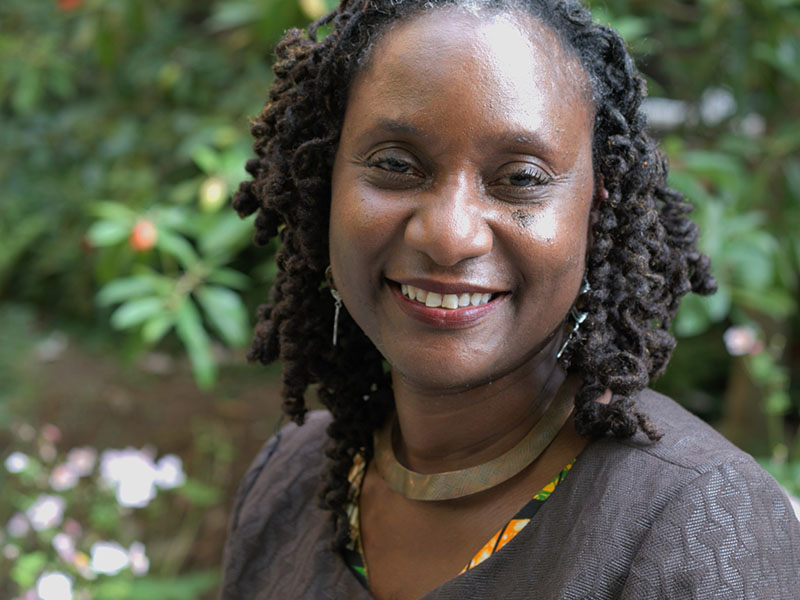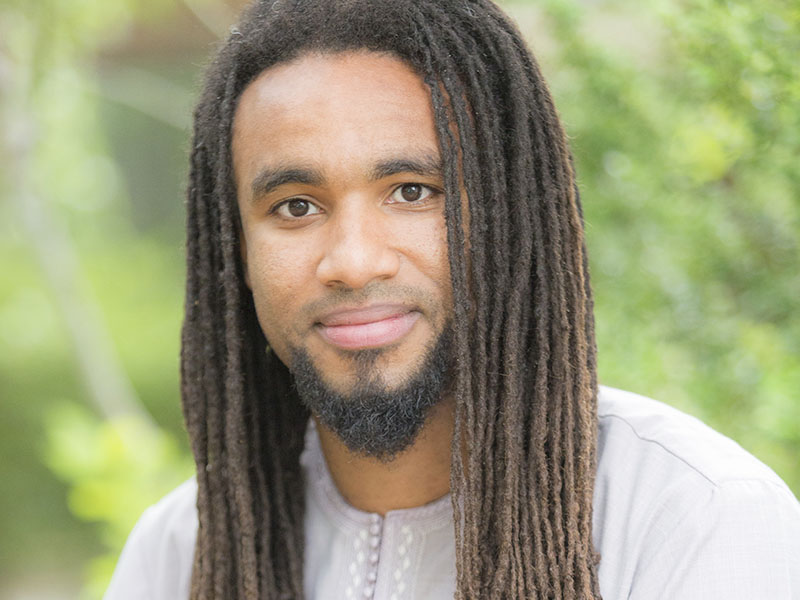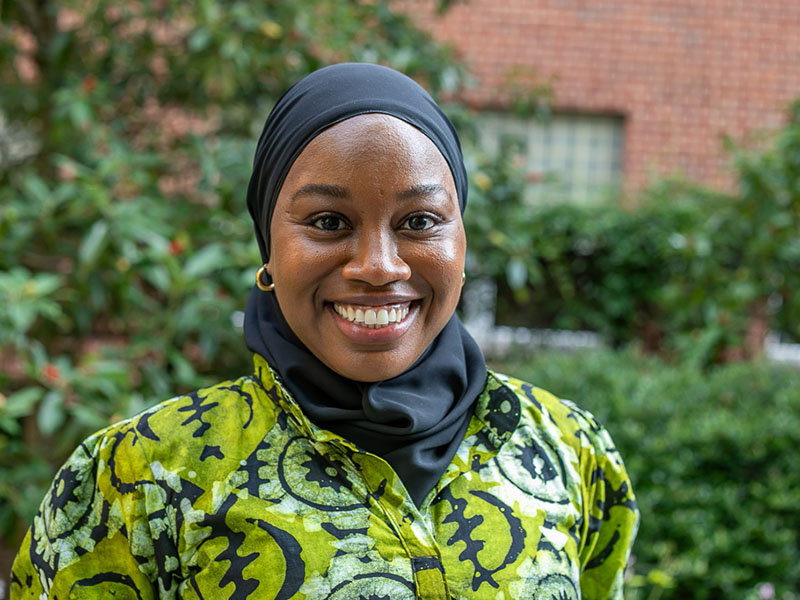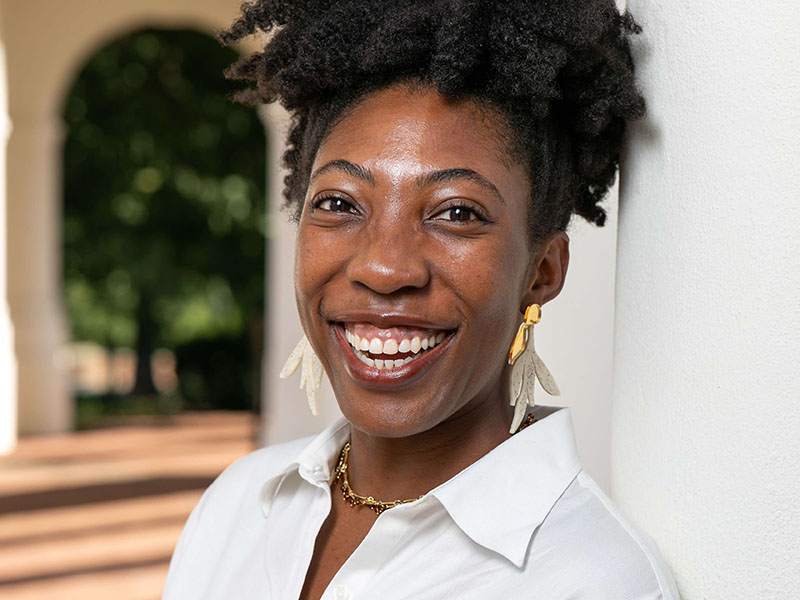Giant Steps for the Woodson Institute

Since the Carter G. Woodson Institute established a Department of African American and African Studies at UVA just six years ago, its faculty has increased in size from one to 19, including four new faculty members who have arrived this year. Over the next year, the department will be taking another big step forward, welcoming as many as four more new faculty members next year to one of the world’s most prestigious centers for both the interdisciplinary and multidisciplinary study of the lives and experiences of African and African-descended people around the world.
Already the home of one of the most coveted pre-doctoral and post-doctoral fellowships in the field of global Black Studies, the Woodson was founded in 1981 to advance the discipline of African American and African studies and the work of Black scholars at UVA. With the support of current provost and former dean of the College and Graduate School of Arts & Sciences, Ian Baucom, in 2017, and the continued support of the College’s newest dean, Christa Acampora, the Woodson has expanded its mission to include educating new generations of undergraduate scholars and has served the needs of nearly 7,000 majors, minors and elective seekers over the last six years.
Offering both an African American and African Studies major and minor the department offers students a rigorous course of study aimed at preparing students for careers in law, medicine, business and academia, but the department is also building a faculty that can equip students with perspectives that are international in scope.
“We want to be a center for global Black studies, and we’re thrilled that our research and curricular profile reflects the Black world,” said Robert Trent Vinson, director and chair of the Woodson. “We’ve built strengths, now, in Afro-Latin America, we’ve deepened our strengths in the Caribbean and Africa, we’re moving now into Black Europe and those Diasporic communities, and we want to do more with African Diasporas in the Indian Ocean and Pacific Ocean to become truly global and to recognize that Black history is world history.”
In addition to attracting world-class scholars to the program, Vinson mentioned, one of the Woodson’s biggest priorities is to build a community of scholars who are working to advance the discipline of African American and African studies in the service of building a better world, ambitions that echo University president Jim Ryan’s mission to make UVA both great and good.
“We want our faculty to be brilliant,” Vinson said, “But we also want them to be good people who are able to engage with their students in meaningful ways, and that’s exactly what these new scholars bring to our community, they’re youthful, they’re energetic and they get that we’re all a part of something larger.”
Meet the four new faculty members joining the Woodson community this fall.
Nemata Blyden, Professor of 19th Century African American History

A scholar specializing in African American, African diaspora and African history, Nemata Blyden is the author of African Americans and Africa: A New History and West Indians in West Africa, 1808-1880: The Diaspora in Reverse. Her teaching and scholarship are focused on the experiences of African-descended people in the nineteenth-century, African American engagement with Africa, African and American and Caribbean migrations to Africa, and thinking about those histories on a global scale. She is currently working on a biography of a black Atlantic family that attempts to tell the history of various spaces in the Atlantic world through the eyes of an extended family.
Blyden holds a Master of Philosophy degree and a Ph.D. in history from Yale University and a bachelor’s degree in history and international relations from Mount Holyoke College. Formerly a professor at George Washington University, Blyden will teach a variety of courses on the Black experience and is in line to be the inaugural holder of the Armstead Robinson chair, named after the Woodson’s founding director.
“Not only am I honored to be at a place named in honor of the great historian, Carter G. Woodson, and among colleagues whose work I admire and value, I believe my work fits in with Armstead Robinson’s vision of making the University, and the Woodson, a center of research on ‘the origins, experiences and present condition of Africans and peoples of African descent throughout the world,’” Blyden said.
Ayodeji Ogunnaike, Assistant Professor

A scholar of African and Afro-diasporic religious traditions in Brazil and Nigeria, Ayodeji Ogunnaike has a keen interest in the interconnectedness of the religious practices in the region. He has studied the religious practice of Ifá divination in Nigeria, the Yoruban practice of orisa worship, and the African diasporic religion Candomblé in Brazil, and he also studies Islam and Christianity on the African continent as well as other Afro-diasporic traditions.
His most recent book project, Forms of Worship: How Oriṣa Devotion Became Religion in Nigeria and Brazil, explores how the worship of traditional Yoruba deities originally differed greatly from Western notions of “religion” but eventually became the most widespread and celebrated indigenous African religion. He is also working on a book entitled Yoruba Mythology: Stories of the Oriṣa, Ijapa and Yoruba Heroes, the first major anthology of Yoruba mythology.
Ogunnaike received his bachelor’s degree in African studies and Near Eastern languages and civilizations, a master’s in religious studies, and a Ph.D. in African and African American Studies from Harvard University. Most recently, he was an assistant professor at Bowdoin College. This fall, Ogunnaike is teaching courses on Afro-Brazilian religion and culture and the connections between Brazil and Africa.
“A major factor in my decision to join the Woodson faculty was Robert Vinson's reputation and vision for research and teaching in African & African American studies,” Ogunnaike said. “I hope to contribute to that vision by conducting research and teaching courses on the ways of life of Africans and Afro-Brazilians, how interconnected they have always been, and how much they have to offer us and our world.”
Fatima Siwaju, Assistant Professor

A cultural anthropologist with fieldwork experience in Colombia, and Trinidad and Tobago, Fatima Siwaju studies Islam in the Americas, citizenship and the politics of belonging, and Africana intellectual traditions.
She is currently working on her first book manuscript exploring the nexus of race, religion and citizenship in the spiritual and sociopolitical lives of Afro-descendant Muslims in the Colombian Pacific. Her research has been supported by the Princeton Institute for International and Regional Studies, the International Institute of Islamic Thought, and the Crossroads Project on Black Religious Histories, Communities, and Cultures in collaboration with the Henry Luce Foundation. Siwaju also served as a 2022-2023 Dissertation Scholar in the Department of Black Studies at the University of California, Santa Barbara.
Originally from Trinidad and Tobago, Siwaju earned her Ph.D. in anthropology with a concentration in African American studies from Princeton University in 2023. She holds a Master of Arts degree in religion from Syracuse University and a Master of Philosophy in development studies from the University of Cambridge. She earned her Bachelor of Arts degree in the modern and medieval French and Spanish languages from the University of Cambridge.
This academic year, she will teach “Introduction to Afro-Latin America,” “Black Islam in the Americas” and “Caribbean Intellectual Traditions.”
Alexandria Smith, Assistant Professor

Alexandria Smith works in the areas of Black feminist and queer literature and theory. She writes and thinks about the roles of embodiment in life writing and theory, the ways that Blackness interacts with and disrupts conceptions of gender and sexuality, and how gendered discourses are constructed in Black cultural work. She is at work on her first book project, an exploration of the distinct and sometimes competing conceptions of Black womanhood produced within Black feminist, queer and trans studies.
Alexandria earned a Ph.D. in women’s, gender and sexuality studies from Rutgers University and a bachelor’s in comparative women’s studies and international studies from Spelman College, and she was a 2021-2023 Woodson postdoctoral fellow.
Her writing has been published or is forthcoming in the journals Anthurium: A Caribbean Studies Journal, The Journal of Feminist Scholarship, Cultural Studies, Black Perspectives, The New Inquiry and others.
This fall, Smith is teaching “Life Writing in the Black Diaspora” and “Black Genders,” both of which she adapted from courses she taught as a postdoctoral fellow.
“My postdoctoral fellowship at the Woodson gave me a model for the kind of intellectual and academic community that I want to work within and contribute to,” Smith said. “I am so excited to be engaged in conversation with students, Fellows, and faculty colleagues about the rich and ever-expanding discourses of gender and sexuality across African diasporas.”








